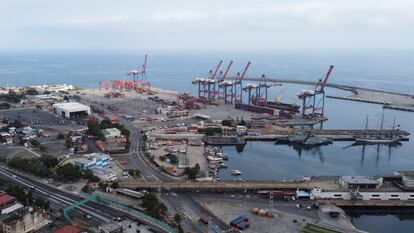The US considers making sanctions against Venezuela more flexible again
Washington sees the registration of opposition presidential candidate Eduardo González Urrutia as a positive gesture, after the Maduro government’s ban on María Corina Machado and others


The leverage of U.S. sanctions has determined the last leg of the Venezuelan political conflict. After revoking two weeks ago one of the oil licenses awarded within the framework of the Barbados Agreement, due to non-compliance on the part of the government of Nicolás Maduro, the Assistant Secretary of State for Western Hemisphere Affairs, Brian A. Nichols, declared this week that they are reconsidering their position after Caracas accepted the candidacy of Edmundo González Urrutia, in the third attempt by the Venezuelan opposition to register a candidate to participate in the presidential elections, and following steps taken to facilitate the work of observers from the European Union and the Carter Center.
In an editorial published in Voice of America, the U.S. official said: “We were forced to suspend General License 44 on oil and gas, issuing a new license, General License 44A, which provides a 45-day winding down period.” He later added: “But we’re also still very much engaged in the process of supporting a competitive election. The selection of a unified opposition candidate in Edmundo Gonzalez Urrutia and his acceptance by the electoral authorities in Venezuela is a very important positive step.”
The suspension of General License 44 did not mean a total return to the scenario of greatest sanctions against Venezuela. The United States gave a late May deadline for companies that started business with the state oil company PDVSA to close the transactions in process and opened the way to the approval of specific licenses for each company that wants to continue operating in Venezuela. But the pressure was enough for Chavismo to abandon its ban on the registration of a third unitary opposition candidate. But President Maduro dismissed the idea that he yielded to pressure from Washington. “There is no sanction, there is no threat that, today, will harm the effort to build a new productive economic model, because today we do not depend on anyone in this world, we only depend on our own effort, our work, the union that we have,” he declared when the license was withdrawn after six months of being active.
Chavismo has continued with the repression nonetheless through its judicial and police branches. Last weekend, three political activists close to opposition leader María Corina Machado were arrested. This persecution against the leader’s entourage was criticized at the beginning of the week by Nichols himself. More opposition politicians have also been disqualified.
Venezuelan officials have assured that they are prepared to live with sanctions. At the same time, they have undertaken a strong campaign against the measures as part of the narrative against the opposition. In Caracas, billboards have been displayed on the highways with messages that hold those who oppose the government responsible for the country’s crisis. Some of these billboards feature the faces of Machado and Leopoldo López, accusing them of having requested sanctions to which the government solely attributes the the economic debacle in the country, even though the fall began long before these measures were imposed.
In this election year, both for Venezuela and the United States, the rope is tightened and loosened according to the movements of each country, which go beyond the formal negotiations between Chavismo and the opposition. The immigration issue is crucial for the domestic policy of the United States, and Venezuelans are topping the list of nationalities exerting pressure on the U.S. border. For Chavismo, relief from sanctions is crucial to increase public spending in the run-up to July 28 in a scenario of social unrest due to low wages and falling consumption. Therefore, in the three months left until the elections in Venezuela, the sanctions lever could move again.
Sign up for our weekly newsletter to get more English-language news coverage from EL PAÍS USA Edition
Tu suscripción se está usando en otro dispositivo
¿Quieres añadir otro usuario a tu suscripción?
Si continúas leyendo en este dispositivo, no se podrá leer en el otro.
FlechaTu suscripción se está usando en otro dispositivo y solo puedes acceder a EL PAÍS desde un dispositivo a la vez.
Si quieres compartir tu cuenta, cambia tu suscripción a la modalidad Premium, así podrás añadir otro usuario. Cada uno accederá con su propia cuenta de email, lo que os permitirá personalizar vuestra experiencia en EL PAÍS.
¿Tienes una suscripción de empresa? Accede aquí para contratar más cuentas.
En el caso de no saber quién está usando tu cuenta, te recomendamos cambiar tu contraseña aquí.
Si decides continuar compartiendo tu cuenta, este mensaje se mostrará en tu dispositivo y en el de la otra persona que está usando tu cuenta de forma indefinida, afectando a tu experiencia de lectura. Puedes consultar aquí los términos y condiciones de la suscripción digital.








































